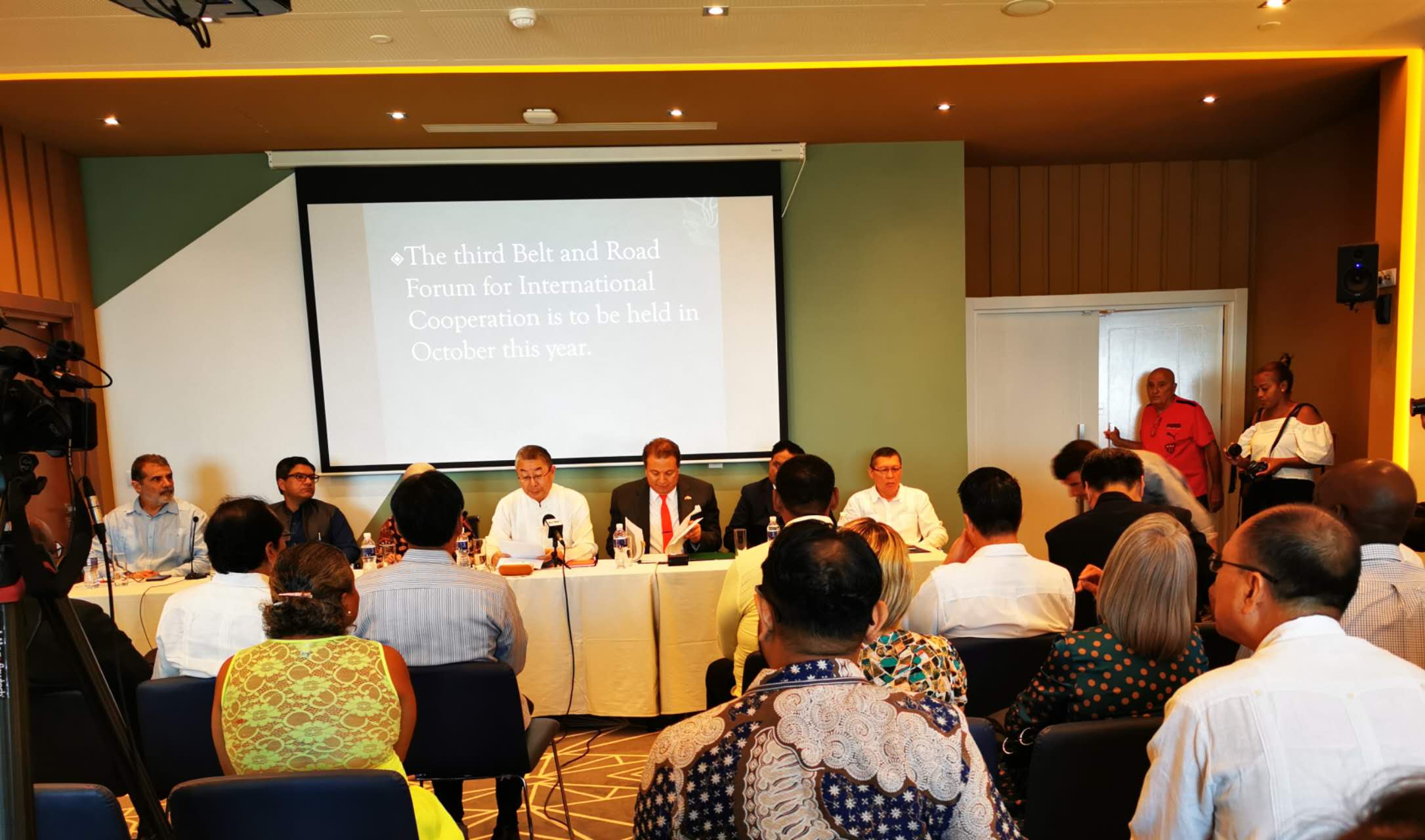(July 6, 2023)

Dear diplomatic colleagues,
Representatives of the Cuban Government,
Friends from Cuban think tanks and media:
Good morning!
This year marks the tenth anniversary of the Belt and Road Initiative (BRI)proposed by Chinese President Xi Jinping.
How is the BRI going? The views of co-hosting countries matter.
I am honored with the presence today of the ambassadors of Kazakhstan, Indonesia, Pakistan, Sri Lanka, and Egypt as well as an expert from the International Policy Research Center (CIPI), who will share their insights on the BRI, especially how BRI is put into practice in their respective countries.
Before that, I will now make my opening remarks.
First, the BRI is the incarnation of the ancient silk roads in our modern times.
2000 years ago, our forefathers opened up the land Silk Road connecting Asia, Europe, and Africa and the Maritime Silk Road connecting the East with the West, ushering in new opportunities for friendly exchanges between various countries and human progress.
The beginning of the 21st century saw various global challenges, and people all over the world strongly desire peace, development, and cooperation.
President Xi Jinping, with deep insights into history and in line with the trend of the times, proposed in September and October 2013 in Kazakhstan and Indonesia, respectively, to build the Silk Road Economic Belt and the 21st Century Maritime Silk Road, that is, the Belt and Road Initiative, BRI.
The BRI integrates the development of China with the development of other countries while leveraging the ancient Silk Road spirits in our times.
Second, the BRI is mutually beneficial for China and other countries in the East or the West.
In the past decade, focusing on policy coordination, infrastructure connectivity, unimpeded trade, financial integration, and people-to-people bond, the BRI has resulted in practical cooperation and mutual learning among civilizations.
More than 150 countries and 32 international organizations have signed up to the BRI.
It attracted a trillion US dollars of investment in over 3,000 cooperation projects and lifted nearly 40 million people out of poverty.
The China-Kazakhstan Lianyungang Logistics Cooperation Base in eastern China has become an important hub for Kazakhstan’s exports to the Asia-Pacific region.
The Jakarta-Bandung high-speed railway project in Indonesia will greatly improve local transportation and logistics.
The China-Pakistan Economic Corridor, the BRI’s flagship project, has achieved fruitful results.
The Suez Economic and Trade Cooperation Zone, jointly built by China and Egypt, has created direct and indirect employment opportunities for more than 50,000 Egyptians.
The Puttalam Power Station in Sri Lanka has lit up thousands of homes.
In Latin America and the Caribbean, the Mariel Photovoltaic Park in Cuba, the China-Ecuador free trade agreement, and the expansion of the China-Argentina currency swap agreement have contributed or will contribute to the development of countries involved.
In short, the BRI promotes the sustainable development of the countries concerned and achieves mutual benefits and common development through “hard connectivity” in infrastructure, “soft connectivity” in rules and standards, and “heart connectivity” among the people of the BRI countries
Third, the BRI is realistic, sincere, open, and inclusive.
The BRI adheres to the principle of extensive consultation, joint contribution, and shared benefits. We should discuss and do things together, instead of engaging in closed and exclusive “small circles”; join hands with each other instead of letting go of each other’s hands; and break down barriers rather than erecting barriers.
China firmly opposes the “zero-sum game”, “decoupling”, and the so-called “de-risking”.
We believe the greatest risk is not to cooperate and the greatest insecurity is the lack of development.
Under the BRI, which upholds the principle of sincerity, real results, amity, and good faith and the principle of pursuing the greater good and shared interest, China strengthens solidarity and cooperation with other developing countries and defends the common interests of developing countries.
Politicians and media in a few countries hyped up the notions of “debt trap” and “neo-colonialism”. Their purpose is to interfere with and undermine the mutually beneficial cooperation between China and the BRI countries.
In fact, what China has offered are opportunities, not risks. China has never created any “traps” or exported colonialism, old or new. Facts can expose lies.
Fourth, the BRI with equal emphasis on quality and efficiency has a promising future.
At present, China is actively promoting the high-quality development of the BRI.
It is an inevitable requirement in order for BRI to adapt to the high-quality development of China’s economy.
As the major economy enjoys the best development momentum, China will continue to coordinate the formation of a new development pattern and the joint building of the BRI.
China will continue to promote high-level opening up to the outside world and identify and encourage cooperation in green, digital, and innovative fields.
Thus China can provide more market, investment, and growth opportunities for BRI partners.
The high-quality development of the BRI is also an inevitable choice if we were to further promote BRI cooperation.
China will host the third Belt and Road High-Level Forum for International Cooperation in October. We will redouble our efforts to further deepen political trust with other countries, enhance connectivity, promote balanced trade development, attract the participation of multilateral development agencies and financial institutions, and further consolidate cultural and people-to-people exchanges so that the BRI can truly be the “Road of Cooperation” “Road of Development” and “Road of Happiness”.

To conclude, I would like to say the BRI is a visible, tangible and practical initiative, not an unrealistic slogan; it is an economic cooperation initiative, not a geopolitical game; it promotes China’s own development as well as the common development of the world; it is mainly for developing countries, but does not exclude developed countries.
In the post-epidemic era, the world economy is yet to recover fully and there are unprecedented challenges ahead.
With its own stability and development, China will continue to promote world peace and progress and cooperate with all parties to achieve win-win results and build a community with a shared future for mankind.
Thank you!